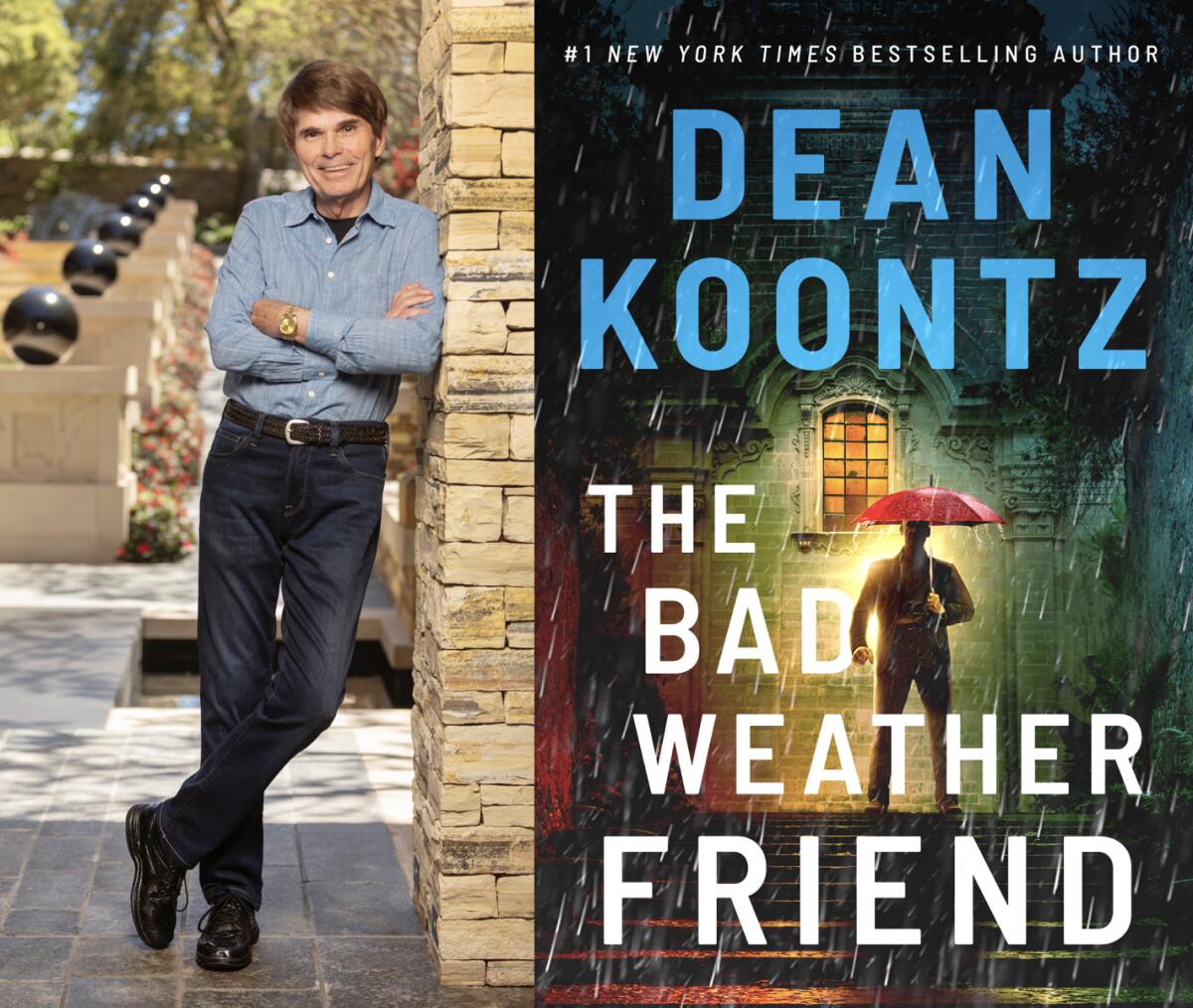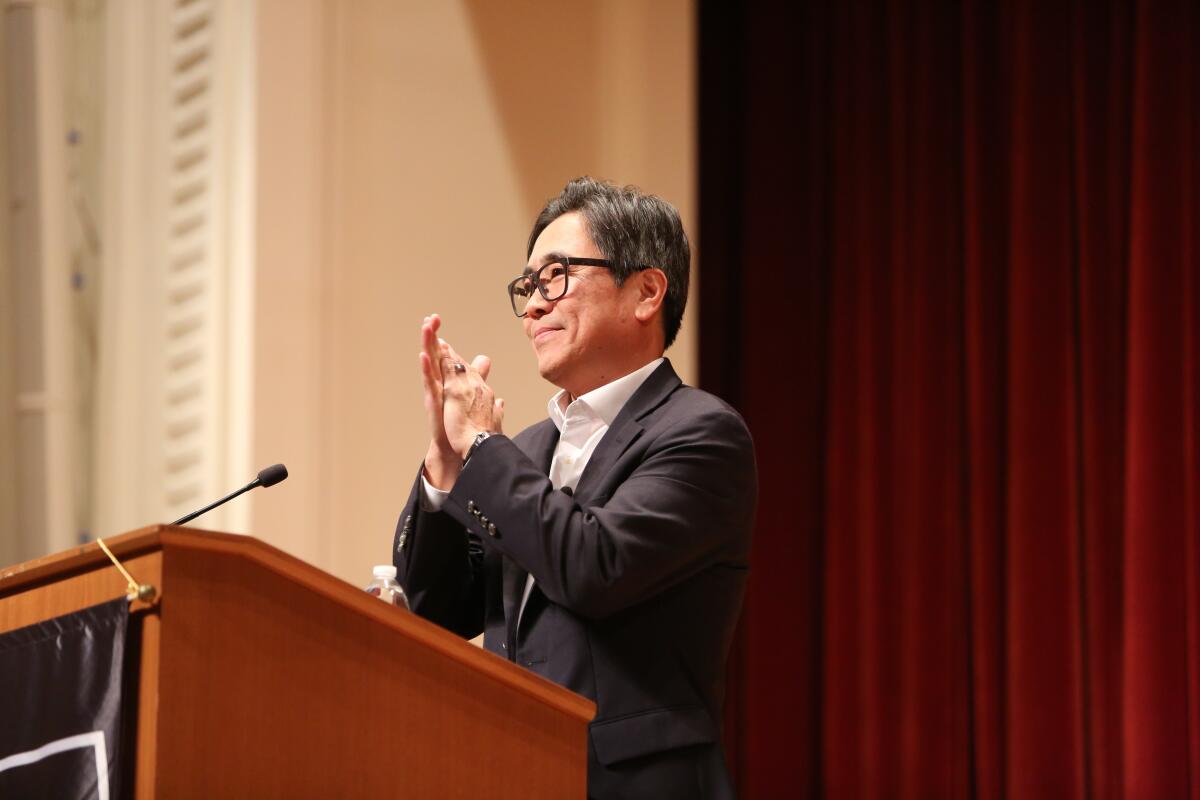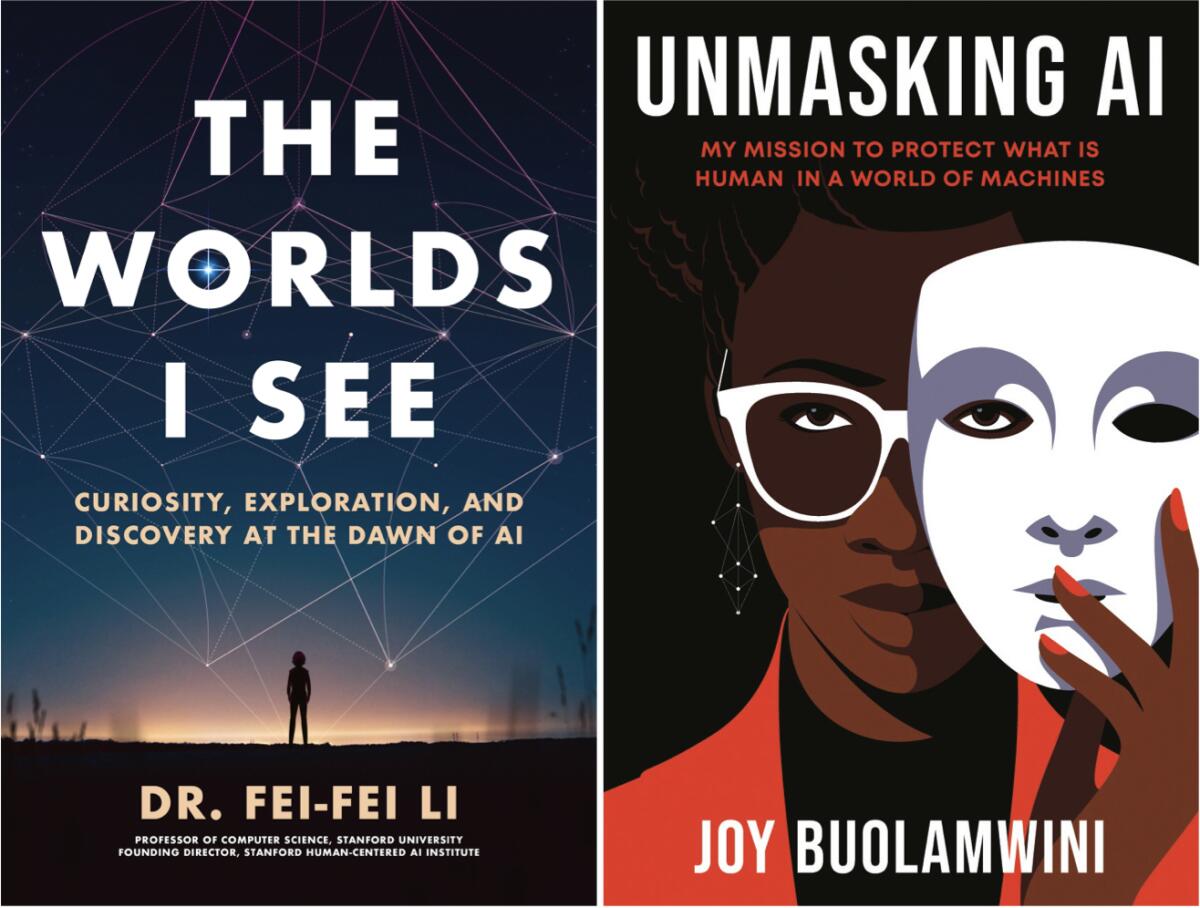Book club: Dean Koontz’s new thriller hits close to home

The L.A. Times Book Club lineup features California Poet Laureate Lee Herrick and bestselling author Dean Koontz.
Good morning, and welcome to the L.A. Times Book Club newsletter.
A turbulent flight turned Dean Koontz off flying decades ago. No problem: His imagination does all the soaring he needs to create the offbeat characters, monstrous villains and haunting themes that populate his steady stream of bestselling suspense novels. “I’m busier than ever,” Koontz told me in an email from his Orange County home, where he likes to stay put. “Three books delivered, one more to complete the current contract, and six TV series in development!”
His upcoming thriller hits close to home. “The Bad Weather Friend” spins the story of a Southern California real estate agent who mysteriously loses his job, his reputation and his fiancée, then reluctantly teams up with a menacing giant named Spike who is intent on helping a nice guy get revenge.
With more than 100 books published, Koontz says “The Bad Weather Friend” is one of his all-time favorites.
On Sunday, Jan. 28, he joins the L.A. Times Book Club for a rare public appearance to talk about his career and his new novel, which will be published Feb. 1. Koontz will be in conversation with Times assistant managing editor Samantha Melbourneweaver at UC Irvine. Get tickets.
The author of the Odd Thomas and Jane Hawk series, Koontz’s most recent books include “After Death” and “The House at the End of the World.” His books have sold more than 500 million copies and are published in 38 languages. He’s also a longtime benefactor of Canine Companions for Independence, a nonprofit he discovered in 1988 while researching a book.
Tell us: What would you like to ask Dean Koontz? Please share your questions, comments and favorite Koontz books in Eventbrite or in an email to [email protected].
December book club
If you haven’t already done so, sign up now for Tuesday’s book club night with California Poet Laureate Lee Herrick.
California’s 10th poet laureate, Herrick joins book club readers to talk about his first year on the road speaking and teaching workshops at schools, libraries, prisons, colleges and community groups throughout the state. This fall Herrick launched “Our California,” a project to get people writing about where they live with an emphasis on social justice.
The Fresno poet and professor will be in conversation with Times editor Steve Padilla starting at 6 p.m. Pacific on Dec. 12. This live streaming book club night is free. Sign up on Eventbrite.

The lists
Fiction at its best: Check out The Times’ list of 13 favorite novels and two short story collections from 2023, including memorable works from Jamel Brinkley, Ed Park, Lauren Groff, Victor LaValle, Yiyun Li and Alice McDermott; and an alternate telling of George Orwell’s “1984.”
Music memoirs: From Madonna to Barbra Streisand to Sly Stone, this was the year music took over our bookshelves. “For whatever reason,” writes Marc Weingarten, “this year has turned out to be a banner publishing moment for musical giants who until now have not been graced with the full-dress books they deserved.”
Best Cookbooks: Times food writers rounded up the standout offerings of 2023, diving into Japanese and Vietnamese vegetarian recipes, Nigerian home cooking, Iranian yogurt making, Mexican grilling and more. Their picks include “The Cookie That Changed My Life and 100 Other Classic Cakes, Cookies, Muffins and Pies That Will Change Yours,” by Nancy Silverton with Carolynn Carreño. Another inspiring choice: “The World Central Kitchen Cookbook: Feeding Humanity, Feeding Hope,” by José Andrés with Sam Chapple-Sokol. “Fittingly, the relief organization’s first cookbook is filled with just as much heart as it is continent-crossing recipes,” says food writer Stephanie Briejo.
Q&A: Best and worst
Tech columnist Brian Merchant writes this week about the worst tech of 2023, an anti-gift guide to the gadgets that should just go away.
The author of “Blood in the Machine: The Origins of the Rebellion Against Big Tech,” Merchant also has ideas about the good stuff — particularly books. I asked about his favorite reads as a follow up to November’s eye-opening AI Book Club Night with Joy Buolamwini (“Unmasking AI”) and Fei-Fei Li (“The Worlds I See”).
What were your essential tech books this year? This was an unusually rich year for books about tech and society. So much good stuff. There’s “Palo Alto” by Malcolm Harris, “Your Face Belongs to Us,” by Kashmir Hill and “Doppelganger” by Naomi Klein. Also a trio of great books on bitcoin: “Number Go Up” by Zeke Faux, “Tokens” by Rachel O’Dwyer, and “Easy Money” by Ben McKenzie and Jacob Silverman. And then there’s “Extremely Online” by Taylor Lorenz, “Selling the American People: Advertising, Optimization, and the Origins of Adtech” by Lee McGuigan and “The Internet Con” by Cory Doctorow.
Your thoughts on the biggest tech story? You could try to argue that the biggest tech story of the year isn’t the rise of generative AI systems like ChatGPT and the companies that build and sell them, like OpenAI, Google and Microsoft, but it’d be an uphill battle. Whether or not you’re convinced that AI will soon radically transform daily life in swift and meaningful ways — and I’m not — Silicon Valley’s great firehose of investment dollars is pointed squarely at the AI space, so that’s where the frenzy is. And it is quite a story, especially as it relates to work; we’ve already seen a number of high-profile struggles between workers concerned AI will be used by bosses to automate their jobs, perhaps most notably the screenwriters in the WGA, who struck in part over such concerns. In this first showdown between human workers and AI, the humans won. This time.
Why you wrote your book: When I was reporting my first book, “The One Device,” a history of the iPhone, I found myself struck by the vast networks of invisible labor that Big Tech relies on — and too often exploits. The first story I ever wrote for the L.A. Times, as it happens, was an op-ed based on that reporting, about Apple’s practice of using tin sourced from mines in Bolivia known to use child labor, back in 2017. Regardless, I found myself thinking back to this academic paper I’d stumbled on and written about in the mid-10s that sought to rehabilitate the Luddites, those much-maligned machine breakers who rose up at the dawn of the Industrial Revolution. I felt there would be plenty of parallels and perhaps lessons to be learned from their struggle against the first round of robots coming for people’s jobs — and I was more right than wrong.
Book you’re most anticipating for 2024: Oh man, I can barely think past 2023 yet, but I am looking forward to Kyle Chayka’s book “Filterworld: How Algorithms Flatten Culture.”

Last word
“Every December, I read Truman Capote’s ’A Christmas Memory’ out loud,” says Firoozeh Dumas, author of “Funny in Farsi,” and other books. “Sometimes I read it out loud alone, although I prefer reading it with loved ones. It is my favorite short story ever. Trust me on this. You will love it. You don’t have to celebrate Christmas to get it; it’s a universal story. Hauntingly beautiful.”
Sign up for our Book Club newsletter
Get the latest news, events and more from the Los Angeles Times Book Club, and help us get L.A. reading and talking.
You may occasionally receive promotional content from the Los Angeles Times.




